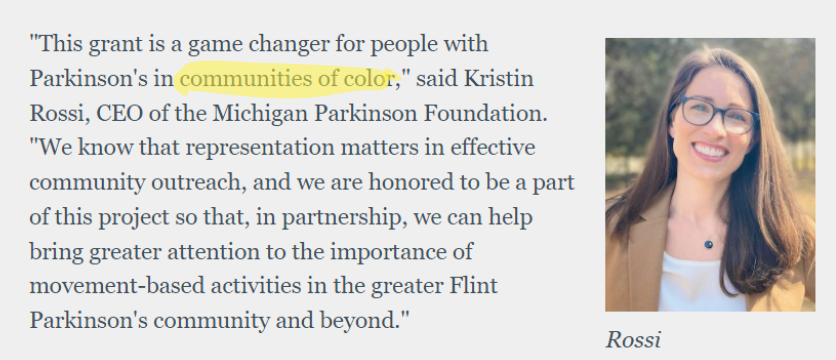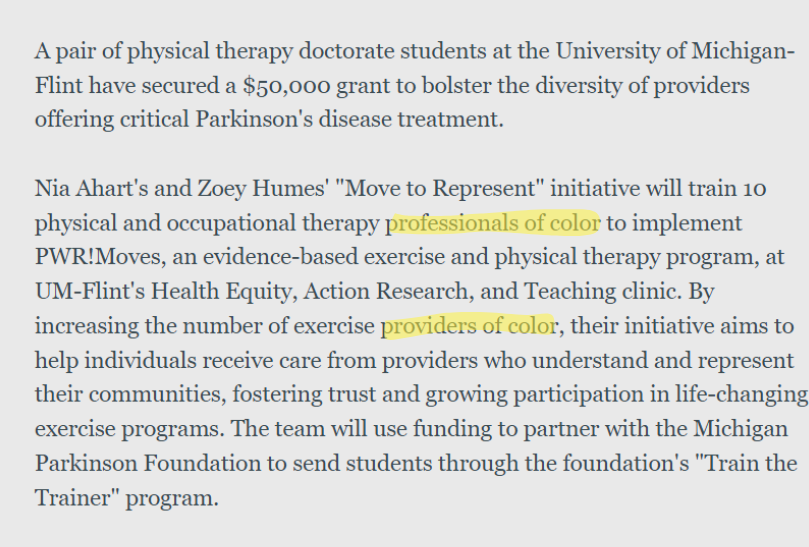Spokesman denies program violated the law while university counsel edits language
A physical therapy training program will no longer exclude students on the basis of race, following a federal civil rights complaint and a College Fix inquiry.
The University of Michigan-Flint originally shared that two of its doctoral students won a $50,000 grant “to improve diversity in Parkinson’s exercise classes,” according to an archived news release.
The “Move to Represent” initiative originally planned to “train 10 physical and occupational therapy professionals of color to implement PWR!Moves, an evidence-based exercise and physical therapy program, at UM-Flint’s Health Equity, Action Research, and Teaching clinic.”
“By increasing the number of exercise providers of color, their initiative aims to help individuals receive care from providers who understand and represent their communities, fostering trust and growing participation in life-changing exercise programs,” the news release stated.
However, that changed when former UMich Flint economics Professor Mark Perry filed a federal civil rights complaint and shared it with university counsel. The complaint filed with the U.S. Department of Education’s Office for Civil Rights accused the university of violating Title VI of the Civil Rights Act of 1964, the Michigan Constitution, and its own nondiscrimination policy.
Soon after, the university scrubbed references to race from the news release.
It even changed the quote from Kristin Rossi, CEO of the Michigan Parkinson’s Foundation. Previously, Rossi said the program would be a “game changer for people with Parkinson’s in communities of color.” Upon legal review, Rossi’s quote now says the program will be a “game changer for people with Parkinson’s in underserved communities.”
Similarly, Professor Amy Yorke’s quotes no longer referenced “people of color” and “persons of color” but now discusses “underserved communities.”

Kristin Rossi’s original quote explaining how the program is focused only on racial minorities.
Associate General Counsel Maya Kobersy told Perry in an email late in the evening on May 16 that the school “has confirmed that the program cited in the referenced article will not limit the training opportunities described to individuals of color.”
Kobersy also said “it is my understanding that the winning proposals are chosen by an independent review committee (whose members are not UM employees); the funding for winning proposals is provided by Molina Healthcare to the individual community organizations with whom students have developed their proposals (in this case, the Michigan Parkinson Foundation).”
“The revised article clarifies that the grant recipient is the Michigan Parkinson Foundation as well,” Kobersy wrote in an email reviewed by The Fix. However, the news release states the grant came “through U-M’s Health Equity Challenge.”
The comments are different from what a university spokesman separately told The Fix earlier in the day on May 16.
“The University of Michigan is committed to advancing knowledge through rigorous, evidence-based research that contributes to the well-being of our state and world,” spokesman Robb King told The Fix in response to a May 14 email. “Our research is conducted in full compliance with federal regulations and requirements. “
The Fix had asked King if there were concerns the program could draw legal scrutiny from the federal Department of Education, if an attorney had reviewed the program for legal compliance, and what research showed people benefit when being treated by someone of the same race.

The original news release that makes clear the program originally aimed to help only non-white students.
The Fix reached out to the students behind the program, Zoey Humes (pictured, left) and Nia Ahart (pictured, right), but neither responded to an email inquiry in the past week.
Perry, the civil rights activist, said he is satisfied with the changes and will withdraw his complaint. He gave further insights to The Fix into how racially discriminatory programs continue to flourish.
He said “graduate students generally aren’t familiar with federal civil rights laws, and it’s somewhat understandable that they weren’t aware that their program’s racial discrimination was illegal.” However, administrators overseeing the students “should be aware of their legal obligation to comply with federal civil rights laws.”
“If they had been aware of the proposal before the two graduate students submitted it, it would have been the responsibility of the administrators to remove any racially exclusionary eligibility restrictions before going forward,” Perry said. “However, in this case, the graduate students likely submitted their proposal without being reviewed by administrators.”
He said the “quick response” from the school’s counsel “suggests that Michigan is taking its legal obligation to actively enforce federal civil rights laws more seriously now than ever before, and for that, I give them credit.”
Perry, a longtime civil rights activist, said “compliance with federal civil rights laws for recipients of federal funds, like Michigan, is not optional, and there are no ‘if you have good intentions’ exceptions to Title VI or Title IX.”
MORE: Economist praises Trump for restarting student loan payments
IMAGE CAPTION AND CREDIT: Students Nia Ahart and Zoey Humes; University of Michigan Flint
